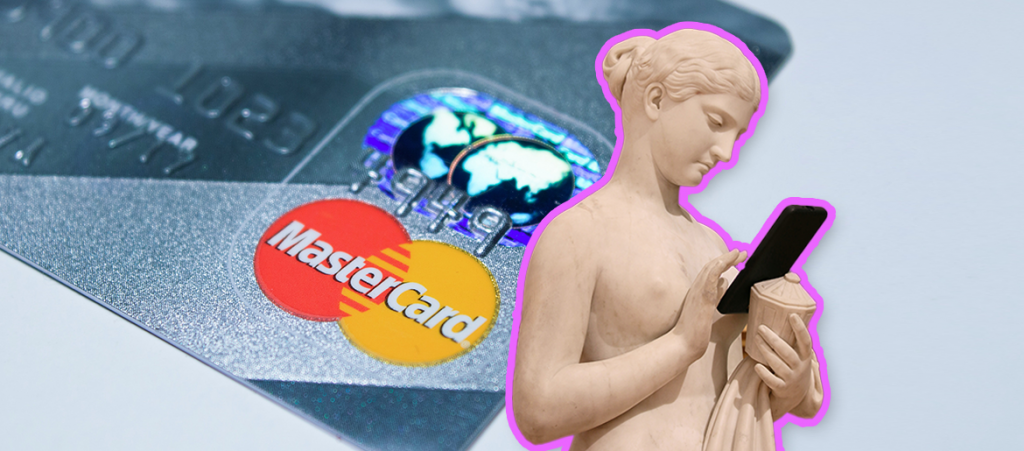
Remember when Only Fans attempted to ban porn? A similar-ish story is unfolding in Australia too. In September, Mastercard announced it will be working with the Australian Government to develop an age verification system… and many people are concerned it could be used to control access to online porn. The credit card giant is partnering with the Federal Digital Transformation Agency on the digital identity program, which aims to help “verify their identity in a safe and secure way, to access government and other services online”.
Civil liberties groups and sex workers are already raising their concerns with the move – should you be worried about it too? Here are the basics.
Ed’s note: This article was updated on 14 October to clarify that Mastercard’s announcement only relates to the development of age verification technology. The company has made no formal announcement about how those systems may eventually be used.
What’s the Government trying to do?
In early 2020, the Standing Committee on Social Policy and Legal Affairs recommended mandatory age verification for anyone viewing online pornography. The government has agreed to implementing this “in principle” by 2023.
The recommendation was made due to “community concern” about the negative impact that some types of online content can have on kids and young people – especially pornography. Submissions made to the Committee listed harms including poor mental health, sexism and objectification and increased tendencies towards sexual violence.
While the government intends to do something, the particulars of how mandatory age verification for porn would are yet to be announced. Australia’s eSafety Commissioner Julie Inman Grant is set to develop a roadmap for implementation by December 2022.
Are the problems with porn that bad?
A scan of the evidence regarding early exposure to pornography by the Australian Institute of Family Studies in 2017 noted that the impacts of pornography were heavily mediated by individual risk factors, social context and the kind of content young people were exposed to. Basically, simply having access to porn at a young age does not automatically or necessarily cause the negative impacts listed in the Committee submissions.
But the report also states that there is growing evidence that adolescents’ use of pornography contributes to other issues worth discussing. Porn is shown to “negatively influence their knowledge about sex, safe sex practices, gender roles, and… unrealistic expectations about sex”.
What is the Digital Identity Program?
The digital identity program is a way for government agencies and other organisation to verify that you are who you say you are online. It covers a wide variety of online products and services, not just porn. Providers who are approved to be part of the Trusted Digital Identity Framework (TDIF) can offer their ID verification services for other companies to use. For example, Eftpos is already approved under TDIF, as is Australia Post and myGovID. Mastercard has also applied for TDIF accreditation.
Companies approved under the TDIF have obvious and straightforward use cases for their ID products, like the myGovID app. But the possible extensions of ID tech, especially when it comes to online porn and gambling companies, does raise big some big questions.
What are the issues with age verification for porn?
There are four main issues with the Government or payment processors like Mastercard using age verification to restrict access to porn:
1. Blocking Access Isn’t Helpful
Sex workers and advocacy groups argue that simply blocking access to adult content won’t help educate and protect young people at all. Gala Vanting, sex workers and National Programs Manager of sex worker organisation Scarlet Alliance told Zee Feed: “The adult industry is invested in preventing young people from seeing things that may not be appropriate for them, but I would challenge the idea that all adult content is harmful”.
This was echoed by porn performer Kim Cums, who told Zee Feed that early exposure to pornography by young people should be tackled by better sex education. “I like to use the Fast and the Furious movie analogy” she notes. “We have teenagers who might be inspired by the film to drive recklessly, so we have drivers ed classes to deal with that. The solution isn’t banning these movies, it’s education and support to be safe drivers on the road”.
“We need educate young people to understand that porn is there for entertainment purposes, it’s not there to be a 100% reflection about what real life sex looks like.”
2. Lack of Details & Transparency
Digital rights groups are also concerned about the lack of details around how age verification will work. “We have very little information about what exactly [they] are doing,” says Justin Warren, Managing Director of PivotNine and Board Member of digital rights organisation Electronic Frontiers Australia. “Perhaps they’ll decide they’re ready to listen to experts in civil society? We need them to stop sucking at computers, but we can’t make them want to.”
These concerns were echoed by Vanting, who noted that sex worker organisations have not been actively involved in recent decisions involving online adult content. “Mandatory age verification stands to have a serious detrimental impact on the adult industry and the roadmap must include adequate consultation with sex workers” she said.
3. The Power of Mastercard and Payment Processors
Mastercard, and more broadly the power of payment processors online, have also been criticised. The company has been involved recent controversial changes to online adult content, including the switch to verified users by PornHub and the (since abandoned) shift by OnlyFans to purge explicit content from its platform.
“Credit card companies tend to be proxy censors” noted Ms Vanting, “Mastercard has played a role historically in the online censorship of sex workers and sex worker content and that raises a red flag for us”.
4. Privacy Issues
Mandatory age verification for porn was attempted in the UK in 2019, but was ultimately abandoned due to concerns about effective enforcement and the risk that personally identifiable information could be compromised by cyber-attacks.
The potential risk to privacy was noted by Kim Cums as a huge concern in the running her own adult website. “Porn websites generally struggle with consumer trust issues” she noted. “So if you add an additional layer of an ID or a special token, people are going to be concerned about what happens with that data”.
She noted that any obligation for age verification would need be balanced against both local and international obligations for privacy protection and security.
“The General Data Protection Regulation in the European Union has strong rules about how much information you are collecting about someone’s sexuality for example, as well as risks of tracking that data” she said. “That’s a huge onerous to be placed on web hosts, performers and small-scale producers if they are collecting age verification information”
Most Australian performers host their content on overseas servers due to local classification laws, and so local laws would need to be followed in regard to privacy.
The Real Reasons Why OnlyFans Is Banning Porn https://t.co/9oDaDLqkWu It’s not so much about investors as it is MasterCard’s upcoming policy changes and the anti-sex-work lobby
— petra (@kutheks) August 22, 2021
What will happen next?
As eSafety Commissioner, Inman Grant says she is looking at the hurdles faced in the UK and other countries in developing an age-verification roadmap for Australia. “Age verification, as overseas experience has shown, is a complex issue, so it is important that all sections of the community are able to be heard” she noted in a statement in August. “We will take a considered, evidence-based approach that takes into account feedback from industry, stakeholders, experts and the public, to find workable solutions.”
You can expect further details regarding the age verification regime, and Mastercard’s involvement, to be announced in coming months.



